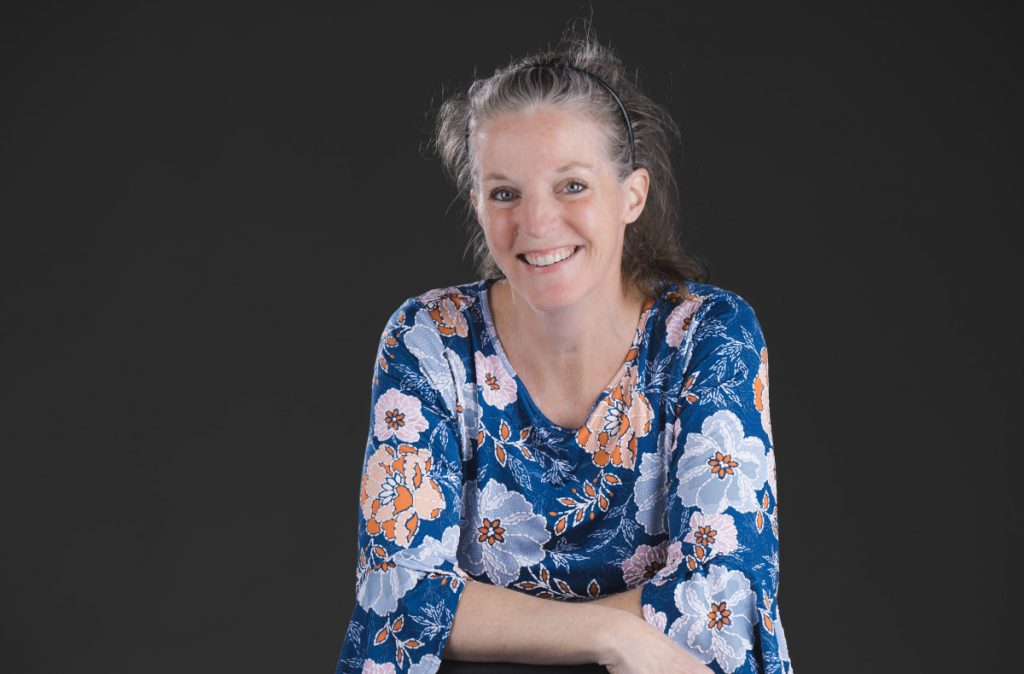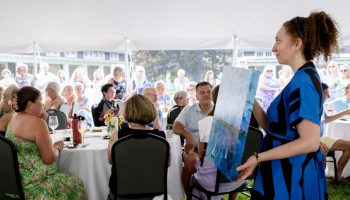
Mariia Novoselia
Staff writer
What, Betsy Burgeson asked, does a pirate call his vegetable patch?
A Garrr-den.
“(Invasive species) are total pirates,” said Burgeson, supervisor of gardens and landscapes at Chautauqua Institution. “They take all the goodness out of the place and steal all the jewels: minerals, nutrients, sunlight – they’re taking all that away from the good guy.”
In this week’s Brown Bag organized by the Bird, Tree & Garden Club at 12:15 p.m. today in Smith Wilkes Hall, Burgeson will talk about what makes a species invasive, and how people can identify and report them. She said she will also go over the kinds of invasives present on the grounds already and the ones Chautauquans should look out for.
More pirate jokes are in store, said Burgeson, who started working in the Institution in January 2015.
“It feels like my second (season) because I still keep learning things every year about which gardens are where and what parts we need to maintain,” she said. “Like they say, time flies when you’re having fun, … (it’s been) almost nine years – holy smokes.”
Burgeson said she has a special place in her heart for the “bunch of absolutely amazing people” that make up the gardens and landscaping team, made up of four full-time and 20 to 25 seasonal workers, who take care of the grounds April through November.
Burgeson said she prefers the term “team,” as opposed to “crew,” because everything they do – watering, mowing, pruning, weeding – is about teamwork.
“They really are a family,” she said. “I could not do what I do, and the gardens would not look the way they do, without this tremendous group of super hard-working people.”
Seeing the impact that she and her team have not only on the aesthetics of the gardens, but also the mindset of people, is what appeals to her about the job the most.
“I love how each garden just transforms every week, and for people to come in and say ‘Wow, this garden looks totally different than it did in Week One’ – I love that, too,” she said.
Burgeson said she hopes her Brown Bag prompts people to change their habits. Something like not throwing hanging baskets into the ravine at the end of the season, for example, can have a significant impact.
“We find all sorts of pots and planters in the … woods, with ivy and Creeping Jenny,” she said. “If we can get people to come to the woodlands over there in the ravine, between the Butterfly (Garden) and the South End, then they start to see what invasive species really are.”
Getting rid of invasive plants in the ravine is a mission that Burgeson and her team took on as part of the Weeding Wednesday initiative, also organized by BTG. Chautauquans can help eradicate invasives from that area of the grounds from 8 to 10 a.m. every Wednesday.
The project, Burgeson said, can show people that they can have a “tangible impact on the grounds” and give them some hands-on experience with invasives.
The ultimate goal of Weeding Wednesdays is restoring the woodland that is currently ruled by invasives like privet, honeysuckle and barberry, and replenishing it with native plants. Starting over, Burgeson said, can be “daunting, yet exciting.”
“We can try things out without fear of failure, honestly, because if we fail at growing something, it’s just a lesson learned,” she said.
Invasive species, however, aren’t restricted to just plants.
The emerald ash borer, for example, is responsible for the Institution losing over 800 ash trees, Burgeson said. The insect was found in Chautauqua County in the late 2000s, but made its way onto the grounds around 2015.
Another native plant target by invasive insects is the hemlock tree. The tree, Burgeson said, can grow in the shade and is crucial for stormwater retention. But hemlock woolly adelgid, she said, sucks the juices at the base of hemlocks’ needles, which prevents them from photosynthesis and leads to them dying off.
“People coming to these talks and learning what types of invasives they can help us identify is just invaluable. … I would rather have a thousand beetles brought to me that are not something, and I’ll say: ‘Oh phew, that’s not it,’ instead of missing that first one Asian longhorn beetle or the spotted lantern fly,” Berguson said. “I don’t mind finding bugs on my desk, as long as they’re in bags or containers.”
Nematodes, which are “microscopic worms” and “the grossest” invasives, she said, cause beech leaf disease. It is unclear, Burgeson said, how to combat them.
“The only thing research says is wait and see what will grow and what can tolerate those worms, so the gardens might go through some transitions,” she said.
Burgeson said she hopes these kinds of BTG programs help Chautauquans see the scale of the impact they can have.
“Hopefully, people will realize that those small little actions do have consequences in both ways – good consequences and bad,” she said. Throwing planters can lead to worms spreading to new gardens, whereas reporting an invasive can help Burgeson’s team get rid of them before they “take hold.”
Being a “third-generation gardener,” Burgeson said she inherited her love for gardening from her parents and grandmother. The latter, along with Burgeson’s mother, had a flower garden, while her father, she said, tended to a vegetable garden.
The gardens on the grounds of the Institution often remind Burgeson of those family gardens.
“They make you feel like you’re at home, or bring up happy memories – that’s what a garden should do,” Burgeson said. “Gardening is hope for the next year, and it’s a legacy that you can leave for future generations; it’s a beautiful way to help change the earth.”




